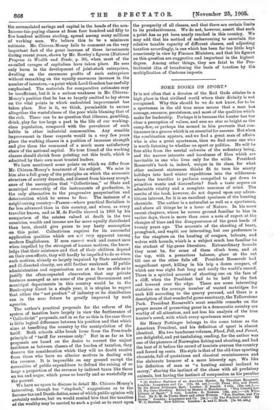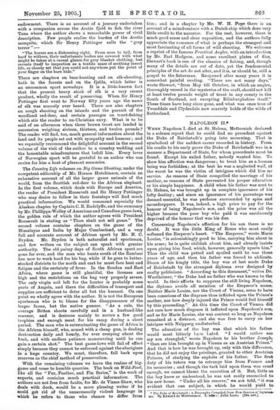SOME BOOBS ON SPORT.*
IT is not often that a devotee of the Red Gods attains to a high place in that civilised world where their divinity is not recognised. Why this should be we do not know, for to be a sportsman in the old true sense means that a man has courage, resource, persistence, and most of the qualities which make for leadership. Perhaps it is because the hunter has too clear a perception of values, and sees no star so bright as the camp-fire; or perhaps the nomad in him prevents that con- tinuance in a groove which is an essential for success. But when the combination appears, and we find a great man of affairs who is also a great sportsman, then we find some one who is worth listening to whether on sport or politics. He will be free alike from the mental cobwebs of the sedentary being, and the narrow interests and harshness of fibre which are inevitable in one who lives only for the wilds. President Roosevelt's book is, indeed, unique in its class, for what other eminent statesman thinks fit to turn his scanty holidays into hard winter expeditions into the wilderness, where the traveller is perforce compelled to get down te• primitive wants and discomforts ? Such a taste argues an admirable vitality and a complete saneness of mind. The merits of the book, however, do not depend upon any adven- titious interest, for it is an excellent specimen of the hunting chronicle. The author is a naturalist as well as a sportsman, and above all thingi he is a lover of Nature. In his more recent chapters, where he covers grciund familiar to him in earlier days, there is more than once a note of regret at the changes of time and the disappearance of the great herds of twenty years ago. The accounts of the shooting of bears, prongbuck, and wapiti are interesting, but our preference is for the chapters on the hunting of cougars, bobcats, and wolves with hounds, which is a subject much less familiar to the student of big-game literature. Extraordinary hounds they must be, for some of them: climb trees, and at the top, with a precarious balance, glare at the cat till one or the other falls off. President Roosevelt had magnificent sport, killing in his trip a dozen cougars, of which one was eight feet long and easily the world's record. There is a spirited account of shooting one on the face of a cliff, when the President had to be held by the feet and lowered over the edge. There are some interesting statistics on the average number of wasted cartridges for each kill according to the quarry pursued, and there is a description of that wonderful game sanctuary, the Yellowstone Park. , President Roosevelt's most sensible remarks on the proper means of preserving game in a democratic country are worthy of all attention, and not less his analysis of the true hunter's creed, with which every sportsman must agree.
Sir Henry Pottinger belongs to the same totem as the American President, and his definition of sport is almost identical. His two handsome volumes, Flood, Fell, and Forest, are delightful, and yet tantalising, reading, for the author was one of the pioneers of Norwegian fishing and shooting, and had the best of it before the crowd of tourists overran the country and forced up rents. His style is that of the old-time sporting chronicle, full of quotations and classical reminiscences and the elaborate humour of a more leisurely age. We like his definition of man as "a hunting animal inclined to mercy," sharing the instinct of the chase with all predatory animals, but having the instinct of compassion as his peculiar
* (1) Outdoor- Pastimes of an American Hunter. By Theodore Roosevelt. • London: Longmans and Co. [12s. 6d. net.]—(2) Flood, Fell, and Forest. By Sir Henry Pottinger. Bart. London : E. Arnold. 2 vols. [Ws. not.]— (3) Big Game Shooting. Edited by Horace G. Hutchinson. "The Country Life Library of -Sport." 2 vols. London : G. Newnes. [258. net.]—(4) Was. Fowl. By Ti.' H. da Visnie Shaw an other Writers. "Fur, Feather, and_ Fus Series." London : Longmans and Co. [6s.1—(5) The Practical Angler. By W. C. Stewart. New Edition. London : A. and C. Black. [3s. f3d. nett,'
endowment. There is an account of a journey undertaken with a companion across the Arctic fjeld to fish the river Tana where the author shows a remarkable power of vivid description. Few People realise the burden of the Arctic mosquito, which Sir Henry Pottinger calls the "grey terror" :—
"The horses are a distressing sight. From nose to tail, from hoof to withers, their unfortunate bodies are covered with what might be taken at a casual glance for grey blanket clothing, but reveals itself to inspection as a textile mass of seething insect life, so closely set that you could not anywhere put the point of your finger on the bare hide."
There are chapters on bear-hunting and on elk-shooting, both in the forests and on the fjelds, which latter is an uncommon sport nowadays. It is a little-known fact that the present heavy stock of elk is a very recent
product, wholly the result of preserving. When Sir Henry Pottinger first went to Norway fifty years ago the name
of elk was scarcely ever heard. There are also chapters on rough shooting on the islands and the pursuit of the woodland red-deer, and certain passages on trout-fishing which stir the reader to un-Christian envy. What is to be said of an afternoon when three brown trout are landed in succession weighing sixteen, thirteen, and twelve pounds ? The reader will find, too, much general information about the land and its people set out with sympathy and humour; and we especially recommend the delightful account in the second volume of the visit of the author to a country wedding and the lamentable misadventures that befell him. Every lover of Norwegian sport will be grateful to an author who can revive for him a host of pleasant memories.
The Country Life volumes on Big Game Shooting, under the competent editorship of Mr. Horace Hutchinson, contain in exhaustive account of all the larger game animals of the world, from the Scottish red-deer to the African elephant. In the first volume, which deals with Europe and America,
the reader of President Roosevelt and Sir Henry Pottinger who may desire to follow in their footsteps will find much practical information. We would commend especially the Alaskan chapter by Captain C. E. Radelyffe, and the summary by Mr. Phillipps-Wolley of American and Canadian game-laws, the golden rule of which the author agrees with President Roosevelt in stating as "Thou shalt not sell game." The second volume contains chapters on the game of the Himalayas and India by Major Cumberland, and a very full and accurate account of African sport by Mr. H. O. Bryden. Mr. Bryden is both naturalist and sportsman, and few writers on the subject can speak with greater authority. The old palmy days of South African sport are gone for ever, and the man who hunts south of the Zambesi has now to work hard for his bag, while if he goes to better.
stockeddistricts to the north and east he must face heat and fatigue and the certainty of fever. In the Soudan and East Africa, where game is still plentiful, the licenses are high and the restrictions on the bag very properly severe. The only virgin soil left for the hunter is probably some parts of Angola, and there the difficulties of transport and supplies are sufficient to deter all but the keenest. On one point we wholly agree with the author. It is not the European
sportsman who is to blame for the disappearance of the larger fauna, but the native gunner. "As a rule, the average Briton shoots carefully and in a husband-like
manner, and is desirous mainly to secure a few good trophies and enough meat for his camp during a short period. The man who is exterminating the game of Africa is the African himself, who, armed with a cheap gun, is dealing destruction daily and hourly, for ever creeping about the bush, and with endless patience manceuvring until he can gain a certain shot." The best game-laws will fail of effect simply because they cannot be enforced against the aborigines in a huge country. We must, therefore, fall back upon reserves as the chief method of preservation.
With the remaining volumes we leave the realms of big. game and come to humble quarries. The book on Wild-Fowl, like all the "Fur, Feather, and Fin Series," is the work of experts., and contains much practical information. The authors are not free from faults, for Mr. de Visme Shaw, who
deals with duck, would be a more pleasing writer if he could get rid of the unnecessarily violent language in which he refers to those who chance to differ from





















































 Previous page
Previous page